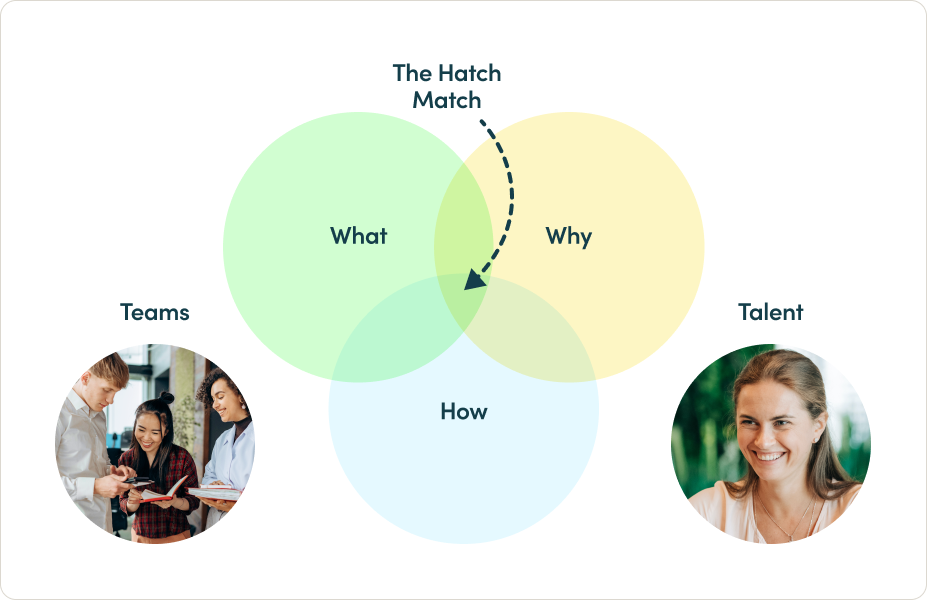We’re on a mission to help everyone find meaning in work. Core to this, is how we think about job searches and matching individuals to jobs.
Picture this: Taylor is a marketing manager at a healthtech startup, looking for a marketing coordinator to join their team. They don’t need the candidate to necessarily have a background in marketing, they’re on the hunt for someone who can manage projects, get creative, and who values collaboration and learning from each other. More importantly, they want someone who cares about their mission in mental health as much as they do.
Blake recently graduated from a Psychology degree, but isn’t sure what to do. For the last few months, they helped a friend’s online store by looking after their Instagram page, and loves being creative. They want their next role to be impactful and they’d like to work with a company that cares about making a difference in mental health. They know a few startups doing great work, but they’re not sure where to find all of the options that would consider them.
How do they find each other?
Right now, job searching is too one dimensional, focused on resumes and job description keywords. We need better tools to represent ourselves and represent jobs. We need to focus on building a more complete model for employers and candidates to connect and interact - so that companies are able to hire people who truly fit, and on the other side - so people can find meaning and fulfilment in their careers.
Employment has been one-sided for a long, long time
We all know we’re more than the words on our resume, and what a role really feels like is more than what’s written in the job description. This hasn’t changed for too long a time, and it’s time we do hiring better.
We’re breaking down the world of work into 3 components that really matter to both employers and candidates.
Our matching is built upon the foundations of a holistic fit matching philosophy, where job seekers and jobs can be matched along dimensions that fit into three categories:
- Why is this opportunity meaningful? What mission motivates the team, company and candidate to do their best,
Why is Blake passionate about mental health?
- What transferable skills and responsibilities does the role require, what are the capabilities of the candidate,
What are the skills required in the marketing coordinator role?
- How does the team and candidate like to work day to day and what is the work style necessary to thrive in this role,
How much does Taylor’s team value collaboration?
We believe that matching across these three categories enable candidates to find meaning in their work, and provide employers with talent that is aligned with their goals and empower their team to achieve their mission.
We’re leveraging the latest in AI and machine learning to create a human-centred view of hiring that brings job searching into the future
Our matching model is supercharged by AI to deliver predictions across millions of possible matches while learning how the world of work is viewed by candidates and employers. AI models can be plug and play in many problem spaces, but hiring is an inherently human experience, and that needs to be embedded into the right AI model.
We use the concept of a knowledge graph to embed our expertise into our matching models and guide the AI algorithms to learn about the world of work, without ingraining the biases that have occurred in the history of hiring. A knowledge graph is a network of entities where relationships between entities are represented by links. Entities in our knowledge graph include elements of our holistic fit philosophy, such as role responsibilities, work styles, and transferable strengths.
Most job descriptions have 6-8 responsibilities, but Taylor knows that the Marketing Coordinator they need should focus on 3 key tasks they are responsible for, the rest is secondary. Taylor can define the role in Hatch to showcase the 3 responsibilities they really care about, described in a way that someone without a background in marketing could still understand.
This enables us to control the way each data input influences a matching outcome, such as the decision to shortlist a candidate.
The fact that Blake has a degree in Psychology isn’t important for the Marketing Coordinator role, but learning to manage projects from their coursework is. Taylor can see that in their profile, rather than guess what Blake learnt in their degree.
Our knowledge graph acquires and integrates information, structuring the data in a way that's easily adaptable over time. This has the added bonus of solving the cold start problem for our recommender systems. It provides us with a programmatic way to model our body of knowledge about the world of work, adapting and improving with the inputs from our users. It enables us to embed our current beliefs on concepts relating to work and person-job fit (like strengths and responsibilities) at different levels of granularity. As we learn and update our beliefs over time, we can update the knowledge graph to reflect our new beliefs.
The result of our knowledge graph and AI model is the ability to provide matches that are relevant to our users
Now that we have a structured way to encapsulate the elements of our holistic fit model, we can use AI algorithms to learn over the knowledge graph, predicting new links and relationships that we learn from our users, and unearth roles for candidates (or candidates for employers) that they may not have considered before.
Blake did not realise a Marketing Coordinator role might be suitable for them, but after understanding the transferable strengths they’ve acquired in their experiences, Taylor’s open role feels like a great fit.
This is actually an extension of the algorithms used to power Large Language Models like ChatGPT, applied to a knowledge graph. A predictive algorithm with this framework enables us to make predictions with varying levels of information, so that we can help users regardless of the completeness of their profile.
Taylor hadn’t yet had time to complete how the team likes to work, but Hatch’s matching knows that most other Marketing teams in similar companies prefer collaboration in their teams. This prediction is then matched to Blake, who had already expressed a preference towards collaboration in their profile.

Matching is at the heart of our product at Hatch, and key to being able to help people find meaning in work. By using our holistic fit framework and knowledge graph, we can provide matches that are relevant to our users and help them discover both roles and candidates that they may not have considered before, opening pathways and opportunities that didn’t exist before, and empowering everyone to find meaning in work.






